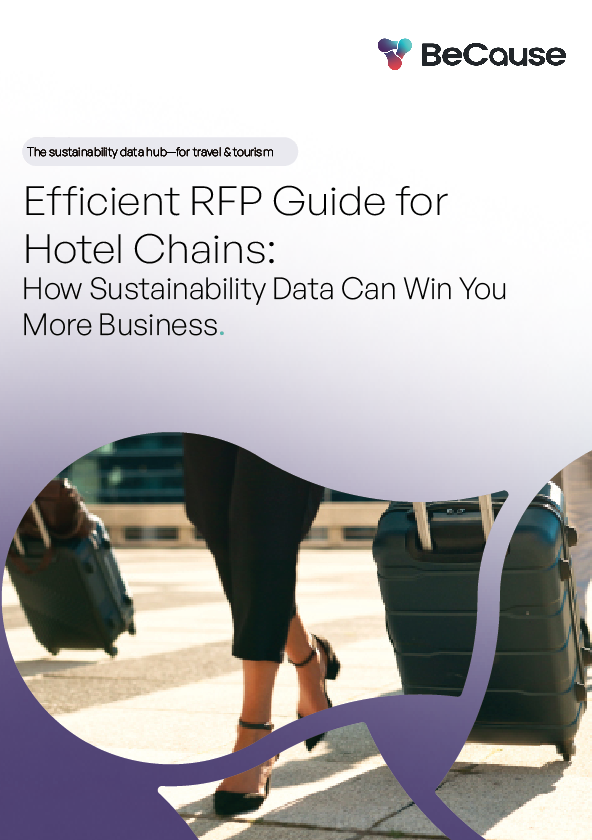How Hotel Chains Can Win More Corporate Business by Mastering RFP Responses



In the competitive hospitality industry, securing corporate contracts often hinges on the ability to respond quickly, accurately, and compellingly to Requests for Proposals (RFPs). With corporate buyers placing increasing emphasis on sustainability and operational transparency, hotel chains that streamline their RFP process and showcase credible ESG (Environmental, Social, Governance) data stand to gain a significant advantage.
Wait! What is an RFP?
A Request for Proposal, or RFP, is a formal document that a business creates when it wants to buy a product or service. Think of it as an invitation asking vendors, like hotels, to offer their best ideas, prices, and plans for meeting the company's needs. In short, the RFP explains what the buyer is looking for.
When hotel chains receive an RFP, they submit a detailed proposal explaining how they can fulfill the request, often including pricing, services offered, and any unique benefits, such as sustainability efforts. This process helps companies compare different options fairly and select the best fit based on quality, cost, and value.
Why optimizing your hotel RFP responses matters
RFPs are detailed and time-sensitive undertakings that require coordination across departments. Industry data shows commercial teams typically spend a few hours per proposal, but the quality of responses can make or break the deal. Recent expert insights from sustainability-focused webinars reveal that buyers prioritize hotels that can provide fast, reliable, and verifiable sustainability credentials alongside operational excellence. Missing or inconsistent data can lead to disqualification and lost revenue.
Centralize your sustainability and operational data
One of the biggest hurdles hotel teams face is collecting scattered sustainability data across properties. Creating a centralized “single source of truth” data hub is critical to maintaining up-to-date certifications, energy and water metrics, waste management data, and social impact reports. This approach not only speeds data retrieval but also ensures accuracy and compliance with recognized frameworks such as HCMI (Hotel Carbon Measurement Initiative) and HWMI (Hotel Water Measurement Initiative).
Automate your RFP process for consistency and speed
Leading hotel chains leverage automation tools integrated with major RFP platforms like Cvent and HRS Green Stay. Automation enables auto-populated responses in sustainability and operational fields, eliminating manual data entry and reducing errors. Experts recommend combining these smart tools with a human touch for storytelling and negotiation, ensuring proposals are both efficient and personalized. See the BeCause RFP feature that integrates sustainability data automatically.
“Cvent released that over 80% of the contracts are awarded to the first three bids that are received from the hotels. So our speed now to market to be able to answer these RF PS quickly are allowing us to also earn and win more business.” – Danielle Rhodes | Sonesta International Hotels | RFP Manager
Interested in how Sonesta International Hotels respond to proposals? See the webinar.
Tailor proposals to corporate buyer priorities
Understanding each RFP issuer’s sustainability goals and buyer personas is vital. Research allows tailoring narratives to highlight certifications, case studies, and initiatives most relevant to buyers’ ESG ambitions. Tailored proposals demonstrate your hotel’s genuine commitment to corporate social responsibility, differentiating you from competitors with generic responses.
Develop standardized yet flexible content templates
Reusable templates that include core sustainability credentials, impact statistics, and case studies streamline proposal generation without sacrificing customization. These templates serve as time-saving frameworks that sales teams can adapt swiftly to meet specific client needs.
Foster cross-departmental collaboration and clear accountability
Successful RFP responses require collaboration among sales, sustainability/ESG, revenue management, and operations teams. Assigning clear roles, setting deadlines, and routinely reviewing drafts ensures accuracy and timeliness. Project management tools help track progress and maintain quality control, avoiding last-minute scrambling.
Showcase measurable sustainability outcomes with data
Concrete, measurable outcomes resonate with corporate buyers. Use metrics like carbon footprint reduction, water savings, waste diversion rates, and community engagement impact to build credibility. Demonstrating ongoing improvement and ESG commitment strengthens proposals and boosts buyer confidence.
Monitor key KPIs to continuously improve your RFP success
Track KPIs such as win rate, response time, compliance score, and buyer engagement to identify bottlenecks and optimize processes. Regular performance reviews lead to smarter targeting, better resource allocation, and ultimately, higher conversion rates on lucrative corporate contracts.
Additional best practices for RFP success:
- Respond quickly: Aim to acknowledge RFPs within hours and deliver complete proposals within 24–48 hours. Speed signals professionalism and enthusiasm.
- Rate incoming RFPs: Evaluate and prioritize bids based on alignment with your offerings and business goals to focus resources effectively.
- Use clear pricing and details: Avoid ambiguity; transparent pricing and complete answers build trust and facilitate faster decisions.
- Build relationships: Personalized connections with corporate clients lead to faster, more tailored responses to future opportunities.
- Follow up strategically: Timely, courteous follow-ups keep your proposal top of mind without overwhelming buyers.
- Leverage technology: Implement RFP management platforms that automate workflows, track interactions, and provide valuable analytics.
- Train teams: Align sales, revenue management, and operations for cohesive, compelling proposals.
By mastering RFP response strategies and leveraging sustainability data effectively, hotel chains can save valuable time, reduce errors, and build winning proposals that attract more corporate business. Investing in process improvements and technology today lays a foundation for sustainable growth and stronger corporate partnerships tomorrow.


